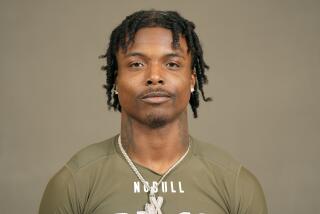A Nontraditional Role for Jackson
The Rev. Jesse Jackson is most often linked to controversies that involve allegations of racial discrimination, police brutality or deadlocked negotiations.
But the civil rights leader accepted a request to represent the family of Rashidi Wheeler, 22, a starting strong safety from Ontario and La Verne Damien High who died Aug. 3 at Northwestern University, because the tragedy hit close to home.
Jackson, a former freshman quarterback at Illinois, is also the father of three sons, Yusef, who played at Virginia, and Jesse Jr. and Jonathan, who were football players at North Carolina A&T.;
“My concern in Rashidi’s death is humanitarian, not as a civil rights leader,” Jackson said. “There’s no evidence of this being a black-and-white issue. I’m addressing this as a father, as a former football player, as the father of three former football players.”
Wheeler’s death has raised questions about whether Northwestern failed to properly respond when he and several of his teammates collapsed while performing rigorous drills on a hot, muggy afternoon. Witnesses recalled a chaotic scene, with trainers and football staffers overwhelmed and ill-equipped to deal with the unfolding emergency. A field phone, for example, was out of order, creating a scramble for an available cell phone to call 911.
Jackson and the Wheeler family said Saturday they declined to comment on player allegations that Wheeler and his teammates had used over-the-counter dietary supplements billed as a way to enhance performance and boost energy. Critics of such pills, powders and liquids contend athletes are often unaware that the products could pose health risks such as severe dehydration and could be especially problematic for Wheeler, a chronic asthmatic.
Although the supplements have not been linked to Wheeler’s death--bronchial asthma has been cited as the cause pending formal autopsy results--Jackson said the probe will be expanded to include the use of supplements.
Northwestern officials must answer whether they knew about athletes’ use of supplements, whether they condoned or ignored such use, and how they plan to combat use that has been described by some as rampant, Jackson said.
“This all falls under the one theme we’re concerned with: Health, and if the players are under unnecessary risk,” Jackson said.
Brian Allen, a Stanford running back and former Damien teammate of Wheeler, said from the family’s Ontario home Saturday that Wheeler’s family is concerned that allegations of supplement use will shift focus in the wrong direction.
“How many people will now make the wrong presumption about Rashidi and the way he died?” Allen asked.
Although Northwestern has launched an investigation into Wheeler’s death, Jackson said he and the family will also conduct an inquiry.
“We hope it’s open, thorough and transparent,” Jackson said of the school’s investigation, “but I don’t believe their review will be enough, that it will reflect their interests in the end.”
Jackson’s prominent role in the case has led some to question whether this is part of a strategy to rehabilitate his image. In January, Jackson acknowledged an extramarital affair with a Los Angeles woman that produced a child. But he dismissed those critics.
“The only opinions that matter to me about this are the parents’,” Jackson said.
Jackson said he was first contacted about the tragedy by a representative of Wheeler’s parents. The circumstances--players gutting out drills in an effort to make the team--struck a chord.
“I know,” Jackson said. “I know when you’re playing football that matters of safety and security are not on your mind. You want to win. You want to survive so you can win. You can’t worry about being tired.”
The Wheeler tragedy also raises concerns about the health and safety of athletes everywhere, he said.
“If Northwestern didn’t have sufficient infrastructure, you must ask, ‘Do all schools have proper infrastructure?’ ” Jackson said. “I’ve seen this entire issue evolve, from the evolution of pads, to additional protective gear, to the study of knee injuries and concussions. Now, you’ve got the Minnesota case [Korey Stringer], this college case and others.”
Jackson attended the Evanston, Ill., service for Wheeler on Tuesday, providing an emotional sermon. He used football terminology, speaking to the assemblage in his classic, attention-grabbing oratorical style.
“Here we are players, in sudden death,” he said. “What do we do in sudden death? Do we panic? Do we give up? What do you do? You can’t walk away! You suck it up! You give it one more try! You’ve got to play twice as hard! You don’t want to lose by forfeit!”
The words provided solace for many, including Wheeler’s teammates.
“I went into that service devastated,” said Jason Wright, a Northwestern sophomore receiver from Diamond Bar who was a close friend of Wheeler and who also collapsed upon completing the conditioning drill that felled Wheeler. “After Jesse spoke, I felt a lot better. And I continue to feel better. There was something about that speech.”
Wheeler’s mother, Linda Will, said last week that it was an easy decision to ask Jackson to be the family’s spokesman.
“He has been around so many events for so long,” Will said. “He is a champion of causes and I have a cause I’m championing. I’m not going to let my son’s name be left in vain.”
A relief fund has been established to assist Wheeler’s family, who delayed the funeral from Friday so Jackson could attend. Jackson will attend Wheeler’s visitation ceremony today at Forest Lawn Memorial-Park in Covina. He will also preside over Wheeler’s funeral Monday at the 2,500-seat First Baptist Church in Pomona.
Jackson, 59, a former aide to slain civil rights leader Dr. Martin Luther King Jr., is perhaps best known for his work fighting racism. But his involvement has run the spectrum. After campaigning for president in 1984 and 1988, his work in recent years has included negotiating the return of captured U.S. airmen in 1999 from former Serbian strongman Slobodan Milosevic. He defended students involved in a riot in stands at a Decatur, Ill., high school football game. And he was hailed by some as a decisive figure in the resolution of a month-long Metropolitan Transit Authority strike that affected 4,300 bus and rail workers.
Jackson is no stranger to the NCAA, having engaged President Cedric Dempsey on a number of issues, including his concern of black players’ graduation rates, minority coaching hires and athletic budgets.
Willie White, a former Pomona City councilman who worked for Jackson’s 1984 presidential campaign, said he will attend Monday’s service to remember Wheeler and listen to Jackson.
“What his visit means to a lot of folks is that Jesse Jackson is a person who cares for the least of us,” White said. “This is a human rights issue. It’s a good cause. I don’t know that he has motives about his image. He had a little incident, but it shouldn’t overshadow the great things he has done. I judge people by their actions. And his action here is to defend a good cause.”
More to Read
Go beyond the scoreboard
Get the latest on L.A.'s teams in the daily Sports Report newsletter.
You may occasionally receive promotional content from the Los Angeles Times.











